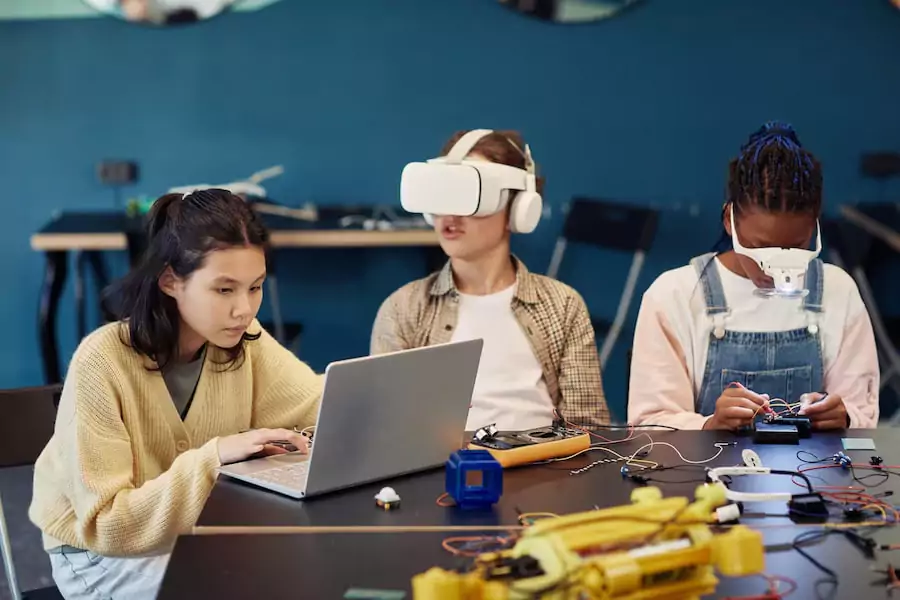The emergence of artificial intelligence has not only revolutionized various industries but also posed significant challenges to professional education. With AI rapidly transforming the work environment, educational leaders must adapt their curricula and training methods to prepare students for the inevitable AI-dominated future.

✅ AI Essay Writer ✅ AI Detector ✅ Plagchecker ✅ Paraphraser
✅ Summarizer ✅ Citation Generator
Key Takeaways:
- Professional education must integrate AI-related topics into their curricula.
- The teaching of critical thinking and adaptability is essential in an AI-driven world.
- Close collaboration with industry partners is crucial to stay updated with AI trends.
- Future education will be significantly shaped by AI, with personalized and immersive learning experiences.
- Understanding and adapting to AI is fundamental to thriving in the future job market.
Adapting Education with AI Integration
In order to thrive in an AI-driven world, it’s imperative that students gain a foundational understanding of what AI is and how it functions. As stated:
“Regardless of the professional domain, understanding what AI is, how it works, how the underlying code and algorithms are designed, and what assumptions lie behind the computer code are important components to being able to use and consume the products of AI tools appropriately.”
Consequently, this dictates a crucial shift in the educational landscape.
Professional education must adapt their curricula to integrate AI-related topics and skills such as data analysis, machine learning, and natural language processing. It’s essential to invest in faculty who possess the technical expertise to teach these subjects, and to collaborate with industry partners to anticipate emerging trends and pioneer new teaching and learning methods. Therefore, the intersection of AI and professional education doesn’t merely demand a theoretical understanding, but an experiential one that empowers students to participate in AI’s continual evolution.

The onset of AI has amplified the need for professional education to focus on more than just the dissemination of specialized knowledge. As mentioned:
“But now more than ever, professional education must foster critical thinking, creativity and adaptability.”
A myopic focus on technical proficiency may leave students unprepared for the dynamic AI-driven job market.
The skills traditionally associated with a liberal arts education, such as critical thinking and adaptability, remain essential. They equip students with the capability to navigate shifting job landscapes and the evolution of AI-supported applications. Emphasizing these skills in professional education programs, in tandem with AI-related technical skills, will provide students with a robust toolkit for success in various contexts.
How AI Will Shape Learning in the Next Decade
AI has an undeniable potential to radically transform education. Its capability to personalize learning, assist teachers with administrative tasks, and provide instant feedback to students will make learning more interactive and efficient. For instance, AI tools can adapt to each learner’s pace, identifying their strengths and weaknesses and providing personalized learning pathways.
Moreover, AI will offer students firsthand experience with AI-supported applications, allowing them to understand the intricate workings of AI systems. Learning platforms may evolve to incorporate virtual reality or augmented reality, making educational experiences more immersive and practical. This innovative blend of education and technology will eventually bridge the gap between academic learning and real-world application.
The rise of AI necessitates a comprehensive overhaul of traditional professional education. To adequately prepare students for a future dominated by AI, it’s critical to introduce AI-related topics into curricula, emphasize essential soft skills like critical thinking and adaptability, and stay abreast of emerging AI trends and applications.
| AI Impact on Education 🎓 | |
|---|---|
| 🌐 Personalization of Learning | AI has the potential to make learning personalized, interactive, and efficient. It can adapt to each learner’s pace, identifying their strengths and weaknesses and providing personalized learning pathways. |
| 💻 AI-Supported Applications | Students can gain firsthand experience with AI-supported applications, enhancing their understanding of the intricate workings of AI systems. |
| 🚀 Immersive Learning Experiences | With the integration of virtual reality or augmented reality, AI can make learning experiences more immersive and practical, bridging the gap between academic learning and real-world application. |
| ⚙️ Revamping Professional Education | The rise of AI necessitates a comprehensive overhaul of traditional professional education. AI-related topics need to be introduced into curricula, critical soft skills like critical thinking and adaptability must be emphasized, and educators must stay abreast of emerging AI trends and applications. |
Follow us on Reddit for more insights and updates.





Comments (0)
Welcome to A*Help comments!
We’re all about debate and discussion at A*Help.
We value the diverse opinions of users, so you may find points of view that you don’t agree with. And that’s cool. However, there are certain things we’re not OK with: attempts to manipulate our data in any way, for example, or the posting of discriminative, offensive, hateful, or disparaging material.